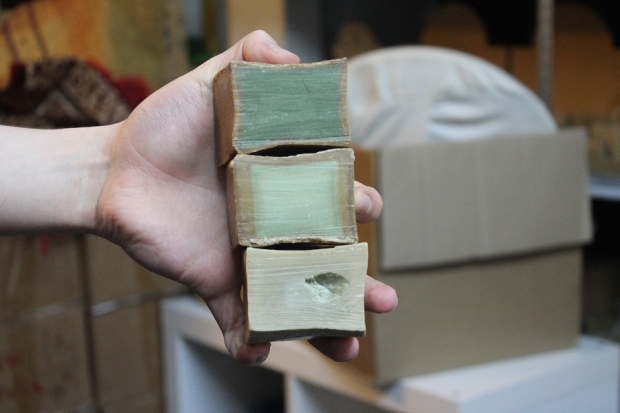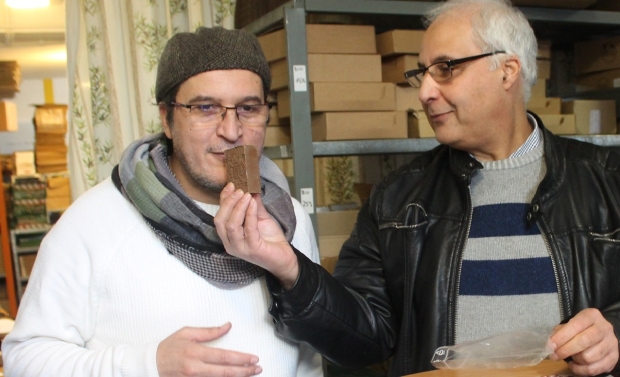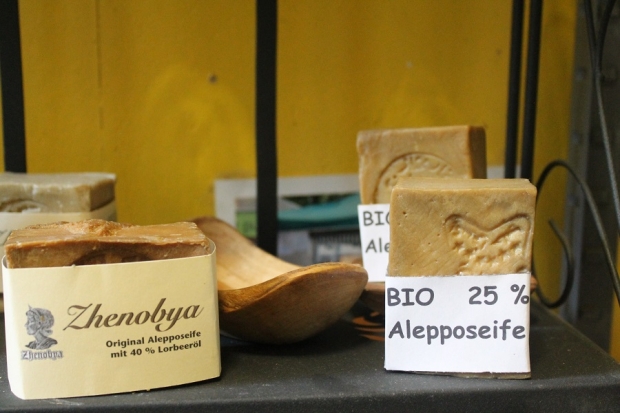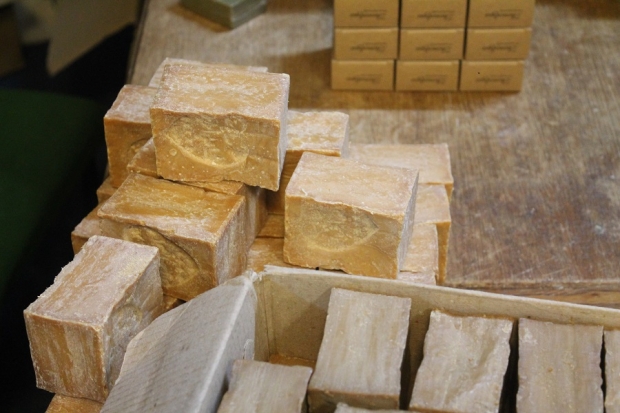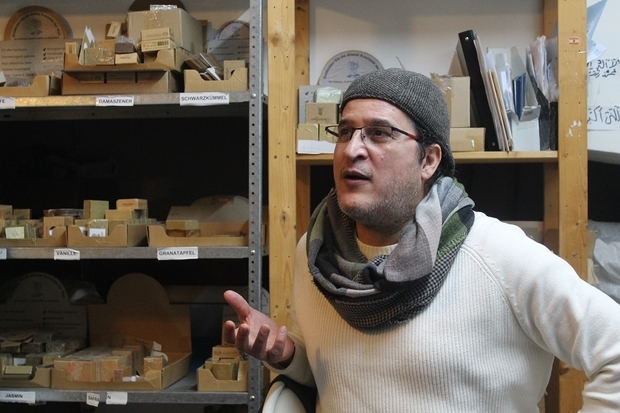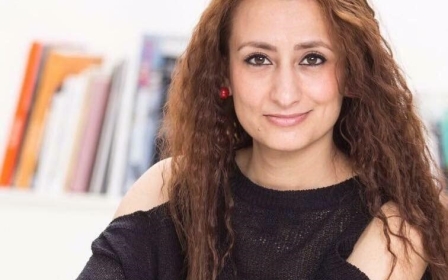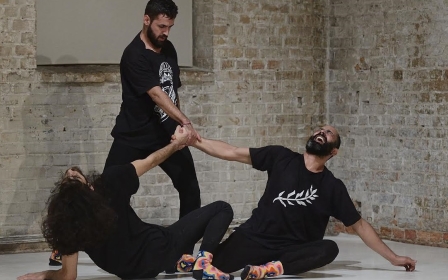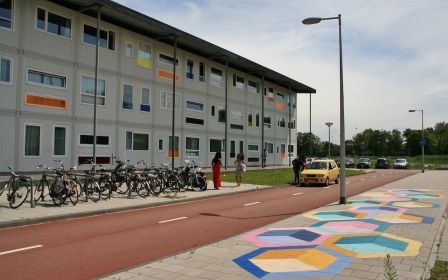Aleppo's green gold: Meet the Syrian bringing a piece of 'home' to Germany
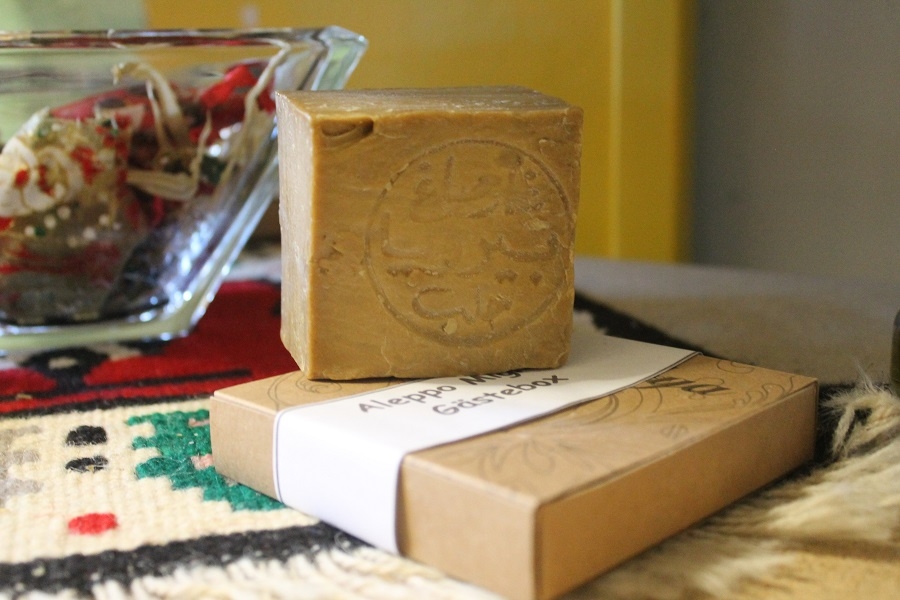
STUTTGART, Germany - Syrian entrepreneur Bassam al-Machout wears his olive green and grey chequered scarf even indoors, as if it’s an indispensable part of his physique, like an extension of his two-day-old stubble. Uninhibited and perpetually in high spirits, he has a personality underscored by an assertive air that screams "let’s get down to business now".
Bassam runs a successful soap business out of Stuttgart called Zhenobya, after a legendary third-century Syrian queen known for her bewitching beauty and strength, as she stood against the Roman empire. It is the only company in Germany that sources soaps directly from Aleppo.
This soap is characterised by its natural ingredients and the heavy, woody scent of olive and laurel oils that permeates the entire facility and cling to one’s clothes, unlike industrial soaps which are usually made from pig fat and sometimes palm and seed oils.
Aleppo soaps attain a darker core as they age; their lime-green interiors disappear into clay brown and to a darker shade when cut open, which gives the soap the nickname Aleppo’s green gold.
The older the soap is, the better it is, like wine
- Bassam al-Machout, Syrian entrepreneur
There was one moment in Bassam's life when he realised the nature of his soap business, which was centred in Aleppo, was about to undergo everlasting change.
In March 2012, the oud-playing 53-year-old was three days into a sourcing trip in Aleppo that was supposed to last for three weeks. Bassam witnessed protests brewing on the city’s streets, as agitated protesters took to the streets demanding the end of Bashar al-Assad's government.
“I instantly knew things weren’t going to get better from then on,” Bassam says, sitting cross-legged while sipping Syrian herbal tea in his office in west Stuttgart. Bassam was born in Tafas in Syria in the 70s and by the age of three he was living in Damascus where he grew up. In the 80s, he moved to Germany and by 1993 he obtained German citizenship.
Soap as the face of resilience
The civil war drastically decimated the soap makers. According to German media reports, rough estimates show that there are only around 10 soap makers active now, one-tenth of the original number.
Since the war began, Aleppo soap no longer comes just from Syria. Soap makers who left the country have taken the trade with them and have started making soaps on a smaller scale, in countries such as Lebanon, Jordan, Egypt and Turkey.
“People were fleeing the city in thousands. But there were also people who chose to stay. Much more than humanitarian aid, they needed work, to live with dignity,” Bassam says.
Zhenobya soaps, on the other hand, are from Aleppo, even as the city only produces a fraction of what it did before 2012.
Bassam had to make a crucial decision as the war raged on and supplies became scarce and he decided to persevere.
Gradually, the German city of Stuttgart became an unlikely ally by indirectly providing labour to people in Aleppo through Bassam, who works with manufacturers in Aleppo such as Schawa and Zanabili. He estimates that when the war was at its height, their soap business was able to support about 45 families in Aleppo.
The origins
Towards the end of 1985, Bassam moved to Berlin, following his older brother Nawras, who was studying for a doctorate in communication studies. Though initially Bassam wanted to be a journalist, the urge to explore opportunities that promised a steadier income grew bigger.
The world was still a paradise back then in Syria
- Bassam al-Machout
The idea to sell the soap occurred to his ex-German wife Barbara who travelled with him across Syria on a family vacation that year. She saw the brown and green bars carved into different shapes in shop display windows and was particularly struck by the soap-making tradition in Aleppo.
“Everything was fine, the world was still a paradise back then in Syria,” he says nostalgically.
The couple returned to Germany with bags of soaps and started a modest online business.
In his offices that double up as a partial workspace, employees sort the bars and pack them in individual brown casings with labels. Brown cartons are stacked high and shelves are lined with blue crates of fenugreek-coloured bars, exposed and waiting to be encased. Around 120 employees are either directly or indirectly involved in the process.
Ancient soap production in Aleppo
“Soap production has been in existence in Aleppo since the eighth century AD,” he says. Not much has changed since, it might seem. In the absence of access to sophisticated industrial equipment, soap production in Aleppo has remained rooted in ancient ways, involving hard manual labour.
Liquid soap is poured onto concrete factory floors in shallow pools so it can be cooled. The soap is then flattened using rudimentary implements and cut by hand and left to dry for a period of between six months and three years. When it is ready to be sold on Germany's retail market, it is sold in bars weighing almost a quarter kilo each for the cost of 4.50 to 6.95 euros ($5.42 to $8.37).
As warring factions laid siege to the city, Aleppo was eventually cleaved into two and this affected production.
In 2013, as the production facilities in the industrial area in eastern Aleppo came under the control of rebel forces, soap production moved into the safety of private homes in safer areas in the western part of the city.
Things gradually grew more difficult as the war raged on. According to Bassam, in a span of a few months, production fell from 10 tonnes to about 1.5 tonnes a year. This crippled the soap industry, as it did the lives of civilians.
“There was constant fear about sniper attacks and people were worried sick even to step out of their homes,” he says.
A lot of factors such as humidity, and ingredients such as the quality of olive oil, make the product unique to Aleppo
- Bassam al-Machout
Yet even more arduous was the process to transport the soaps from the production facilities to the nearest port in Latakia from where the pellets would be shipped to Hamburg in Germany.
The war was damaging the already crippled road infrastructure and as areas alternated between the control of rebel and government forces, the route became increasingly dicey.
Daredevil drivers familiar with safer routes offered their services at an elevated cost during wartime. At checkpoints, he says, guards took protection money mostly in the form of soaps, further depleting the stock. During this time he lost between $55,000 to $60,000.
As life in Aleppo is slowly limping back to normalcy, soap-making operations are resuming too.
In the past year, Zhenobya has been at the centre of unwitting media attention in Germany. This has heightened the popularity of Aleppo soaps as conscious German buyers buy up the product, and there are outlets increasingly willing to stock it.
The al-Machouts are in talks to expand their operations across Europe and ship soaps to Spain, Poland and Austria.
Aleppo soap centred in art
Aleppo soap has been at the centre of artistic work in recent years in Germany. South German artist Rita Viehoff used them recently in her work to depict the city of Aleppo amid destruction.
A French-American artist, Emmanuel Tussore, used bricks of Aleppo soap to hand craft sculptures for his project Study for a Soap.
He integrated Aleppo soap in a series of sculptures, installations, photographs and films displayed in Berlin in November 2017.
What’s more important is I’m bringing a piece of my culture from my home country to my adopted home, and I’m proud of that
- Bassam al-Machout
For people of Aleppo such as Najib Albarazi, a 35-year-old banking professional who is now resettled in Essen in northwest Germany, these soaps are an inherent part of Syrian life.
“It is customary for each family to buy [a] yearly supply of Aleppo soaps, usually in huge quantities in gunny bags,” he says. But he hasn’t used these since 2012, the year he moved to Dubai for work and then later to Germany, where he sought asylum as the war raged on in Aleppo.
“The only losers in the Syrian war are the people. In the current climate of misrepresentation of Syria and its people in the media, the al-Machouts deserve to be commended for introducing a unique and hitherto unknown aspect of Syrian culture to Germany,” says Albarazi. “There is also a story of successful integration that proves how Syrians can contribute productively to German society.”
“I was advised by chamber of commerce officials to hire a financial consultant. But it wasn’t fruitful in the larger scheme of things,” he says. Admittedly, no sophisticated consultant can predict the volatility of doing business with a country such as Syria whose strongest suit is not constitutional stability.
Throughout all of this, Bassam’s resolute conviction to source the soaps directly from Aleppo even as civil unrest plagued the city has served him well. He considers it his contribution to his country.
“I had nothing else to lose except money,” he says, remembering the wartime risk. “What’s more important is that I’m bringing a piece of my culture from my home country to my adopted home, and I’m proud of that.”
New MEE newsletter: Jerusalem Dispatch
Sign up to get the latest insights and analysis on Israel-Palestine, alongside Turkey Unpacked and other MEE newsletters
Middle East Eye delivers independent and unrivalled coverage and analysis of the Middle East, North Africa and beyond. To learn more about republishing this content and the associated fees, please fill out this form. More about MEE can be found here.


